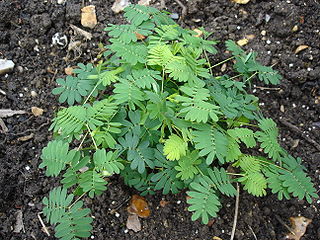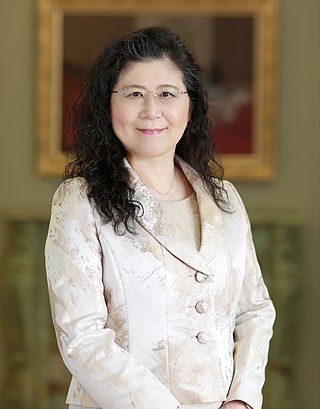
Eric Richard Kandel is an Austrian-born American medical doctor who specialized in psychiatry, a neuroscientist and a professor of biochemistry and biophysics at the College of Physicians and Surgeons at Columbia University. He was a recipient of the 2000 Nobel Prize in Physiology or Medicine for his research on the physiological basis of memory storage in neurons. He shared the prize with Arvid Carlsson and Paul Greengard.
The following outline is provided as an overview of and topical guide to neuroscience:

James L. McGaugh is an American neurobiologist and author working in the field of learning and memory. He is a Distinguished Professor Emeritus in the Department of Neurobiology and Behavior at the University of California, Irvine and a fellow and founding director of the Center for the Neurobiology of Learning and Memory.

Plant perception is the ability of plants to sense and respond to the environment by adjusting their morphology and physiology. Botanical research has revealed that plants are capable of reacting to a broad range of stimuli, including chemicals, gravity, light, moisture, infections, temperature, oxygen and carbon dioxide concentrations, parasite infestation, disease, physical disruption, sound, and touch. The scientific study of plant perception is informed by numerous disciplines, such as plant physiology, ecology, and molecular biology.

Allan N. Schore is an American psychologist and researcher in the field of neuropsychology.

Current Biology is a biweekly peer-reviewed scientific journal that covers all areas of biology, especially molecular biology, cell biology, genetics, neurobiology, ecology, and evolutionary biology. The journal includes research articles, various types of review articles, as well as an editorial magazine section. The journal was established in 1991 by the Current Science group, acquired by Elsevier in 1998 and has since 2001 been part of Cell Press, a subdivision of Elsevier. According to Journal Citation Reports, the journal has a 2020 impact factor of 10.834. It was categorized as a "high impact journal" by the Superfund Research Program.

Ann Martin Graybiel is an Institute Professor and a faculty member in the Department of Brain and Cognitive Sciences at the Massachusetts Institute of Technology. She is also an investigator at the McGovern Institute for Brain Research. She is an expert on the basal ganglia and the neurophysiology of habit formation, implicit learning, and her work is relevant to Parkinson's disease, Huntington's disease, obsessive–compulsive disorder, substance abuse and other disorders that affect the basal ganglia.
Yadin Dudai is a neuroscientist, Professor (emeritus) of Neurobiology at the Weizmann Institute of Science in Rehovot, Israel, and the Albert and Blanche Willner Family Global Distinguished Professor of Neural Science at New York University (NYU).

Neurobiology of Aging is a peer-reviewed monthly scientific journal published by Elsevier. The editor-in-chief is Peter R. Rapp. Neurobiology of Aging publishes research in which the primary emphasis addresses the mechanisms of nervous system-changes during aging and in age-related diseases. Approaches are behavioral, biochemical, cellular, molecular, morphological, neurological, neuropathological, pharmacological, and physiological.

Memory is the faculty of the mind by which data or information is encoded, stored, and retrieved when needed. It is the retention of information over time for the purpose of influencing future action. If past events could not be remembered, it would be impossible for language, relationships, or personal identity to develop. Memory loss is usually described as forgetfulness or amnesia.
Intermediate-term memory (ITM) is a stage of memory distinct from sensory memory, working memory/short-term memory, and long-term memory. While sensory memory persists for several milliseconds, working memory persists for up to thirty seconds, and long-term memory persists from thirty minutes to the end of an individual's life, intermediate-term memory persists for about two to three hours. This overlap in the durations of these memory processes indicates that they occur simultaneously, rather than sequentially. Indeed, intermediate-term facilitation can be produced in the absence of long-term facilitation. However, the boundaries between these forms of memory are not clear-cut, and they can vary depending on the task. Intermediate-term memory is thought to be supported by the parahippocampal cortex.
The Center for the Neurobiology of Learning and Memory (CNLM) is a research center established in 1983 in the School of Biological Sciences at the University of California, Irvine that studies memory and learning. Center faculty reported the first known case of hyperthymesia; they have also done research on false memory syndrome. James McGaugh was the founding director, and noted memory expert Elizabeth Loftus is a research fellow of the center.

Learning & Memory is a monthly peer-reviewed scientific journal covering the neurobiology of learning and memory. It was established in 1994 and is published by Cold Spring Harbor Laboratory Press. The editor-in-chief is John H. Byrne.
Cognitive biology is an emerging science that regards natural cognition as a biological function. It is based on the theoretical assumption that every organism—whether a single cell or multicellular—is continually engaged in systematic acts of cognition coupled with intentional behaviors, i.e., a sensory-motor coupling. That is to say, if an organism can sense stimuli in its environment and respond accordingly, it is cognitive. Any explanation of how natural cognition may manifest in an organism is constrained by the biological conditions in which its genes survive from one generation to the next. And since by Darwinian theory the species of every organism is evolving from a common root, three further elements of cognitive biology are required: (i) the study of cognition in one species of organism is useful, through contrast and comparison, to the study of another species’ cognitive abilities; (ii) it is useful to proceed from organisms with simpler to those with more complex cognitive systems, and (iii) the greater the number and variety of species studied in this regard, the more we understand the nature of cognition.
Plant cognition is the proposed cognition of plants. The study of plant cognition explores the idea that plants are capable of responding to and learning from stimuli in their surroundings in order to choose and make decisions that are most appropriate to ensure survival. Over recent years, experimental evidence for the cognitive nature of plants has grown rapidly and has revealed the extent to which plants can use senses and cognition to respond to their environments. Some researchers claim that plants process information in similar ways as animal nervous systems.
Edwin "Ted" G. Abel is an American neuroscientist, and the founding Director of the Iowa Neuroscience Institute at University of Iowa and previously the Brush Family Professor of Biology at University of Pennsylvania.

Insect cognition describes the mental capacities and study of those capacities in insects. The field developed from comparative psychology where early studies focused more on animal behavior. Researchers have examined insect cognition in bees, fruit flies, and wasps.

Martin Giurfa is an Argentinean-French neurobiologist and neuroethologist, member of the German National Academy of Sciences Leopoldina, the Académie royale des sciences, des lettres et des beaux-arts de Belgique, and the Institut Universitaire de France (IUF). He is acknowledged for his work on the neural mechanisms of cognition in invertebrates, which he mostly explores using honeybees as models for understanding basic principles of learning and memory.

Ikue Mori is a Japanese scientist. She is known for her work on molecular, cellular and neural circuit analyses of thermotaxis behavior in C. elegans. She is Director of Neuroscience Institute and Professor of Molecular Neurobiology of the Graduate School of Science in Nagoya University, Japan. In 2013, she became the first woman to receive Tokizane Award, the most prestigious neuroscience award in Japan, and in 2017, was awarded Medal of Honor with Purple Ribbon.











